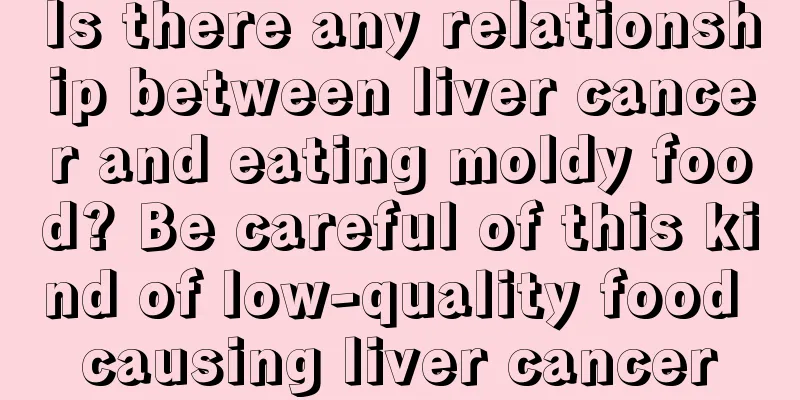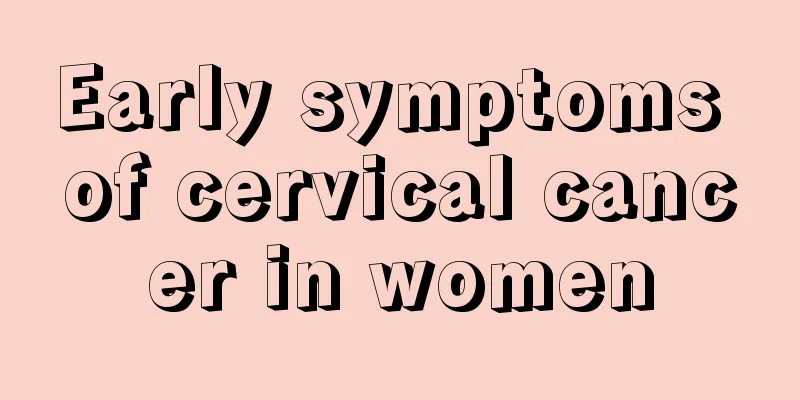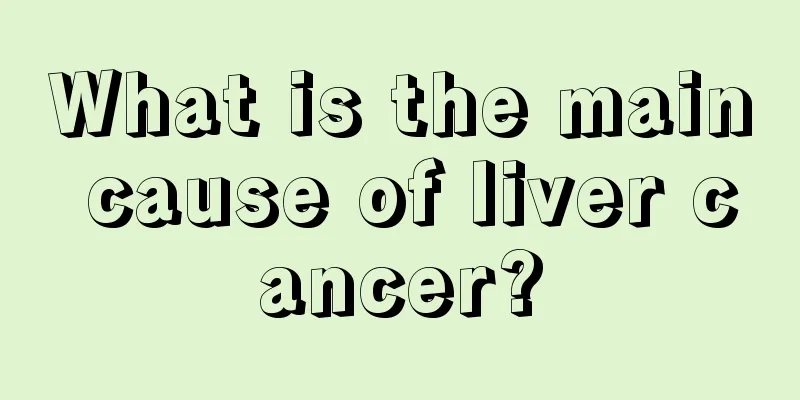Is there any relationship between liver cancer and eating moldy food? Be careful of this kind of low-quality food causing liver cancer

|
Soy sauce is an indispensable condiment on the Chinese table. The Chinese discovered the secret of brewing soy sauce a long time ago. In the Western Han Dynasty more than 2,000 years ago, soy sauce had already been widely used and produced. However, in recent years, experts have found that there is a direct relationship between soy sauce and liver cancer, and the incidence of liver cancer is directly proportional to the amount of soy sauce consumed. It is generally believed that the main raw material of soy sauce is soybeans, and soybeans and their products have anti-cancer effects because they are rich in minerals such as selenium. However, it is worth noting that during the production, storage, transportation and sales of soy sauce, it is often contaminated due to poor sanitary conditions and may even carry pathogenic bacteria that cause intestinal infectious diseases. The problem of bulk soy sauce is more obvious. Experiments have shown that typhoid bacilli can survive in soy sauce for two days, and halophilic bacteria can survive in soy sauce for a long time. In turbid, precipitated, and impure soy sauce, the number of bacteria will be more than 100 times higher than the standard. If such soy sauce is consumed directly without heating and disinfection, it may cause illness. In addition, researchers have found carcinogens in soy sauce. Epidemiological experts in Taiwan have found that the consumption of soy sauce is directly related to liver cancer. This is because during the fermentation process of soy sauce, the protein decomposes and produces a large amount of amines. In the presence of nitrite, carcinogenic nitrosamines will be synthesized. Soy sauce produced by some manufacturers with poor production technology is very susceptible to mold contamination. Therefore, from the perspective of disease prevention, in addition to buying bottled soy sauce of reliable quality and not buying bulk soy sauce, you should also pay attention to eating soy sauce cooked as much as possible, not eating it raw. Inventory of 7 liver cancer factors 1. Viral hepatitis Among the known hepatitis viruses, except for hepatitis A virus, all are related to liver cancer, but the most widely studied and relatively consistent view is that hepatitis B virus (HBV) and hepatitis C virus (HCV) are closely related to liver cancer. Continuous infection with hepatitis B virus and hepatitis C virus leads to chronic hepatitis and cirrhosis, and some patients develop liver cancer on this basis. Hepatitis B virus (HBV) is the main cause of disease in developing countries, while hepatitis C virus (HCV) is the main cause of disease in developed countries. Chronic HBV infection increases the risk of liver cancer by 200 times. 2. Eating food contaminated with aflatoxin and its mycotoxin Studies have found that more than 10 kinds of mycotoxins can induce tumors in different organs of animals. Aspergillus flavus is one of several toxic molds, and its toxin B1 (aflatoxin B1, AFB1) is highly toxic to the liver. A large number of investigations and studies have found that the distribution map of Aspergillus flavus pollution is almost consistent with the geographical distribution of liver cancer high-incidence areas. After food containing AFB1 is ingested, it is absorbed into the liver, causing liver cell degeneration and necrosis, and then inducing liver cancer. Aflatoxin has a strong hepatocarcinogenic effect, and aflatoxin B1 is 75 times more potent than dimethylnitrosamine in causing liver cancer in rats. Feeding experimental animals with grain contaminated by aflatoxin in liver cancer high-incidence areas in my country can induce liver cancer in 80% of cases after 6 months. The intake of aflatoxin B1 is positively correlated with the mortality rate of liver cancer. In addition, aflatoxin B1 and hepatitis B virus also have a synergistic hepatocarcinogenic effect. Aflatoxin thrives in high temperature and high humidity environments, especially in summer, where moldy foods, grains, and feed are most likely to be contaminated by Aflatoxin and produce aflatoxin B1. Long-term consumption of foods containing this toxin can induce liver cancer. Foods that are prone to mold include rice, wheat, soybeans, peanuts, corn, and rapeseed oil. 3. Water pollution The contamination of drinking water by certain chemical carcinogens and certain algae is also related to the occurrence of liver cancer. More than 100 carcinogenic or cancer-promoting substances have been found in polluted water. Drinking water, especially pond water, is often polluted by organic carcinogens (such as hexachlorobenzene, benzopyrene, polychlorinated biphenyls, etc.). In Qidong, Jiangsu Province, a high-incidence area for liver cancer, there is a significant difference in the incidence of liver cancer between residents who drink pond water and those who drink well water. The incidence of liver cancer among residents who drink pond water is 60-100/100,000, while that among those who drink well water or deep well water is less than 20/100,000. There is a kind of blue-green algae in pond water in my country that can produce algal toxins - microcystins, which have been proven to be a strong cancer promoter. 4. Drinking Epidemiological surveys have shown that long-term heavy drinking is associated with liver cancer. Drinking has a significant and independent effect on the occurrence of liver cancer, and it shows a significant dose-effect relationship. It is generally believed that excessive drinking often leads to liver cancer through fatty liver, alcoholic hepatitis and cirrhosis. Among alcoholic cirrhosis, 10% to 30% develop liver cancer. Liver cancer in Europe and the United States is often associated with alcoholic liver disease. Studies have shown that drinking more than 80g of alcohol a day for more than 10 years increases the risk of liver cancer by five times compared to drinking less than 80g of alcohol a day. If patients with hepatitis C drink alcohol, the risk of liver cancer is twice that of those with hepatitis C alone. 5. Chemical carcinogens Some chemical substances such as nitrosamines, azo mustards, alcohol, organochlorine pesticides, etc. are carcinogens of liver cancer. Among them, N-nitroso compounds are the main ones. Animal experiments have found that dimethylnitrosamine and 3-nitroaniline can induce liver cancer. Epidemiological surveys show that individuals who have long-term exposure to pesticides or insecticides have a significantly increased risk of liver cancer. Animal experiments have confirmed that some highly toxic pesticides such as pentachlorophenol and hexachlorobenzene can induce liver cancer. my country is a large agricultural country, and people should be careful when using organic solvents such as pesticides or insecticides. 6. Disease factors Studies have found that some diseases can increase the risk of liver cancer, such as diabetes, esophageal varices, cirrhosis, obesity, fatty liver, hereditary hemochromatosis, hereditary telangiectasia, α1-antitrypsin deficiency, etc. At present, the carcinogenic mechanism of related disease factors is still unclear. 7. Genetic factors Liver cancer has obvious familial aggregation and genetic susceptibility. The number of people with liver cancer in families with blood relations to liver cancer cases is far greater than that in unrelated families, and the incidence in close relatives is higher than that in distant relatives. The incidence of liver cancer in first-degree relatives is significantly higher than that in the control group (twice). Don't eat these four types of food to prevent liver cancer 1. Do not eat moldy food In spring, food is prone to mold. Aflatoxin in moldy food is a liver cancer-causing substance, which takes only 24 weeks to cause cancer. Therefore, food should be properly stored and discarded immediately once it is moldy, especially soybeans, peanuts, sweet potatoes, sugar cane, etc. Do not eat it again. In addition, peanut oil should not be stored for a long time. If it is found to have a rancid smell, it should not be eaten. Otherwise, it will not only taste bad, but more importantly, it will cause cancer. 2. Eat less salted fish, pickled vegetables and other pickled foods Pickled vegetables such as sauerkraut, pickles, and salted fish are refreshing and appetizing. As the weather gets hotter, people lose their appetite and prefer to eat pickled vegetables with rice. However, pickled vegetables contain a large amount of nitrosamines, which have been shown to be related to the occurrence of liver cancer. It is best not to eat them or eat less. And remember, you must pickle them thoroughly before eating. 3. Do not drink or drink less alcohol Long-term drinking will cause the alcohol to digest the gastric mucosa. Once the gastric cells are damaged, the toxic substances in the food will be easily absorbed by the stomach, which can easily cause alcoholic hepatitis, damage the liver's detoxification function, and even cause alcoholic cirrhosis. This is a risk factor for liver cancer. If you drink moldy peanuts with alcohol, the possibility of inducing liver cancer will be greater. Dr. Dong recommends that adult men should not drink more than 2 cups of alcohol per day, and women should not drink more than 1 cup. No or little drinking 4. Animal and vegetable oils should not be eaten after they have gone bad Stale oils all contain the chemical component malondialdehyde, which can generate polymers and react with proteins and deoxyribonucleic acid in the human body, causing the protein structure to mutate, causing the cells with mutated proteins to lose their normal functions and transform into early cancer cells. In addition, malondialdehyde polymers can hinder The replication of DNA accelerates the aging process. Therefore, animal and vegetable oils should not be stored for too long. Oils that have deteriorated and have a rancid smell are not suitable for consumption. Foods fried with rancid oil not only taste bad, but more importantly, can cause cancer and shorten life expectancy. |
Recommend
How much does it usually cost to see a pituitary tumor?
There are quite a few patients with pituitary tum...
What are the symptoms of poor metabolism
If people's daily diet and daily life are irr...
What are the clinical manifestations of prostate cancer
When it comes to prostate cancer, many men are ve...
Is it okay to take calcium tablets if you have osteosarcoma
Osteosarcoma is a common disease, which usually o...
What should I do if I have swollen lymph nodes in my neck?
Swollen lymph nodes in the neck may be caused by ...
Ovarian tumor symptoms, common clinical symptoms of ovarian tumors
When an ovarian tumor occurs, there will be sympt...
What are the dietary treatments for nasopharyngeal cancer? How much does it cost to treat nasopharyngeal cancer?
Nasopharyngeal cancer brings inconvenience to man...
Four major characteristics of gastric cancer in young people
According to statistics from the China Anti-Cance...
Why are my feet cold when I sleep in winter
Many people have cold feet when sleeping in winte...
What to do with abdominal bloating and constipation
Abdominal bloating and constipation are very comm...
Who are the people suitable for seal oil
Speaking of seal oil, many people may think of it...
Chuanwu mugwort honey drink can relieve cancer pain in patients with cervical cancer
After cervical cancer patients develop the diseas...
What is renal hamartoma and what tests should be done to confirm it
Renal hamartoma is a benign tumor usually compose...
Why does my throat itch and my ears itch as well?
In daily life, some people always have itchy thro...
Dietary precautions for patients with lymphoma
I believe everyone is very familiar with lymphoma...









